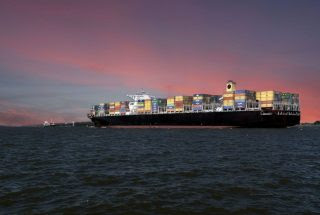The American Bureau of Shipping (ABS) has launched its Low Carbon
Shipping Outlook with the aim of evaluating ways of achieving
emissions-reduction goals.
Shipping Outlook with the aim of evaluating ways of achieving
emissions-reduction goals.
The outlook (available for download here) defines ship
technologies, operational efficiencies and alternative fuels and energy sources
needed to reach the International Maritime Organization’s (IMO) 2030 and 2050 targets.
technologies, operational efficiencies and alternative fuels and energy sources
needed to reach the International Maritime Organization’s (IMO) 2030 and 2050 targets.
According to ABS, the 2030 targets can be met through operational
measures and efficiencies, driven by connectivity and data analytics and energy
efficient design, while fuels are in focus to get to 2050. The conceptual
designs confirm that the fuel technology today does not meet the 2050 demands.
measures and efficiencies, driven by connectivity and data analytics and energy
efficient design, while fuels are in focus to get to 2050. The conceptual
designs confirm that the fuel technology today does not meet the 2050 demands.
ABS said the challenge to adopt alternative fuels
globally was best illustrated by the fact that it has taken 10 years for LNG
bunkering infrastructure to develop and supply less than 1 percent of the
global fleet. Other alternative fuels would face similar infrastructure
development, regulatory and supply chain challenges, it was noted.
globally was best illustrated by the fact that it has taken 10 years for LNG
bunkering infrastructure to develop and supply less than 1 percent of the
global fleet. Other alternative fuels would face similar infrastructure
development, regulatory and supply chain challenges, it was noted.
“Despite all the noise and confusion about
IMO 2020, the disruption from the global sulphur cap is likely to be dwarfed by
what comes after it. The greatest challenge of our generation – and the next –
will be the decarbonization of the shipping industry,” Christopher
J. Wiernicki, ABS Chairman, President and CEO, said.
IMO 2020, the disruption from the global sulphur cap is likely to be dwarfed by
what comes after it. The greatest challenge of our generation – and the next –
will be the decarbonization of the shipping industry,” Christopher
J. Wiernicki, ABS Chairman, President and CEO, said.
“That’s why ABS has published this outlook
to inform the shipping industry as it journeys into the unknown waters of the
2030/2050 emissions challenge. It is designed to help bring into focus the
numerous issues surrounding the decarbonization movement as it evolves from
today’s ambitions to tomorrow’s reality.”
to inform the shipping industry as it journeys into the unknown waters of the
2030/2050 emissions challenge. It is designed to help bring into focus the
numerous issues surrounding the decarbonization movement as it evolves from
today’s ambitions to tomorrow’s reality.”
To
assess the potential of the main operational options available to shipping, ABS
commissioned a study from Maritime Strategies International (MSI) to analyze
the potential impact on the industry’s carbon footprint.
assess the potential of the main operational options available to shipping, ABS
commissioned a study from Maritime Strategies International (MSI) to analyze
the potential impact on the industry’s carbon footprint.
ABS also worked with the Herbert Engineering Corporation to specify
design requirements for two concept containerships which, while too advanced to
be built today, shine a light on the gap between state-of-the-art technology
and the demands of the 2050 greenhouse gas (GHG) targets.
design requirements for two concept containerships which, while too advanced to
be built today, shine a light on the gap between state-of-the-art technology
and the demands of the 2050 greenhouse gas (GHG) targets.
Speaking to World Maritime News on the shipping industry’s
decarbonization goals in May 2018, Kirsi Tikka, Executive Vice President,
Senior Maritime Advisor, at ABS, shed more light on the challenges lying ahead.
decarbonization goals in May 2018, Kirsi Tikka, Executive Vice President,
Senior Maritime Advisor, at ABS, shed more light on the challenges lying ahead.
Among others, Tikka explained that collaboration by all stakeholders as well as
sufficient investment in technology development are crucial to achieve the envisaged
decarbonization goals.
sufficient investment in technology development are crucial to achieve the envisaged
decarbonization goals.
World Maritime News.

